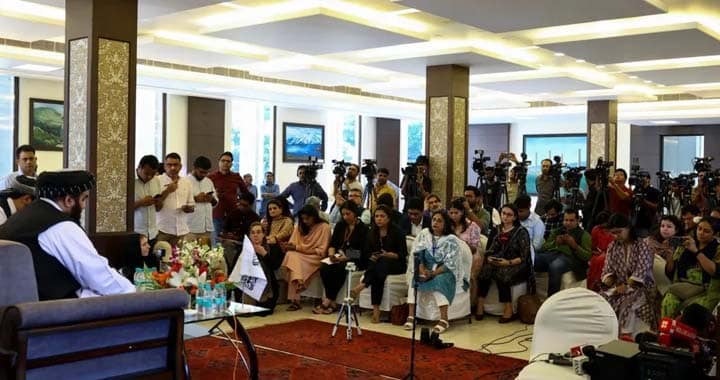What happens when two patriarchal regimes collide with principled resistance? In a rare moment of clarity, a group of Indian women journalists exposed the double standards of both the Afghan Taliban and India’s ruling establishment; not with slogans, but with questions, presence, and unflinching resolve.
The so-called brotherly neighbour and Islamic partner; Afghanistan, under its ungrateful and treacherous interim rulers, and India, the self-proclaimed champion of secularism and democracy under Modi’s government, have both laid bare their true faces in a shared act of anti-Pakistan sentiment and moral double standards.
In doing so, the Taliban have betrayed their own so-called Sharia principles, while Modi’s India has once again let the last bit of air escape from the already deflating balloon of its so-called secularism. The result? The ugly face of “New India” has become even more apparent to the world. But amidst this convergence of extremism and hypocrisy, India’s female journalists emerged as the real victors, their principled and courageous stance not only exposed both regimes but brought them to their knees.
Yes, this is no allegation or emotional claim. The world has just witnessed the duplicity of both India and the Taliban with undeniable clarity. What’s more, Afghans living abroad, and in particular Afghan women, were among those who watched this drama unfold, and perhaps even felt a strange satisfaction seeing Taliban’s acting foreign minister, Amir Khan Muttaqi, retreat and stumble before female Indian journalists.
His trip to India, carefully choreographed, instead turned into a diplomatic embarrassment.
During his first press conference in New Delhi, Taliban’s security officials explicitly barred female journalists from entering the press hall. This wasn’t some slip-up or mistake; it was the same misogynistic policy that the Taliban have enforced inside Afghanistan for the past four years, in the name of “Amr Bil Ma’ruf” (the so-called religious duty of ‘enjoining good’). But this time, the audience was not silent. Indian female journalists, backed by media associations and public opinion, confronted both the Indian and Afghan foreign ministers, demanding an explanation and a reversal of the discriminatory act.
They succeeded. Amir Khan Muttaqi was forced to backtrack, and under pressure, held a second press conference; this time, in front of the very women he had sought to exclude.
But these women didn’t just sit quietly.
They boldly posted their photos from the new press conference as a mark of defiance, and then proceeded to grill the Taliban representative with sharp and uncompromising questions, especially around the Taliban’s inhumane restrictions on female education. His answers, by all accounts, were evasive, misleading, and outright dishonest.
This incident starkly revealed the hypocrisy and double standards of the Taliban regime on women’s rights, not just internally, but on the international stage. On one hand, they invoke their so-called internal religious “principles” to justify removing women from public, political, and educational spaces. But when the question of global legitimacy and political acceptance arises, they suddenly change tune and retreat from their self-righteous claims.
This episode exposed a bitter truth: religious rigidity crumbles in the face of political interest, and when international attention shines too bright, even hardliners bend.
But the Taliban aren’t the only ones exposed here.
This incident also raises serious questions about India’s own commitment to women’s rights and its political silence. Despite claiming to be the world’s largest democracy and a loud advocate of gender equality, India’s initial silence and cordial reception of a Taliban delegation; a group with a notorious record of crushing women’s rights, was telling. It showed that political convenience and diplomatic opportunity often override any real commitment to justice or principle.
It reflects a deeper issue; a growing sense of retreat within India’s own feminist and democratic fabric. Publicly, rights are praised; in practice, the defence of those rights often depends on whether they align with geopolitical interests. This gap between words and action is where real injustice festers.
And yet, the women journalists of India flipped the script.
Their collective resistance and solidarity became the brightest moment in an otherwise murky affair. A number of Indian female journalists came together, not just to protest, but to ensure the Taliban’s minister was forced to change course. Their presence wasn’t just symbolic; it had real consequences. It forced the Taliban to re-engage, this time on terms they had tried to deny. This single act of united defiance proved that when media professionals stand together against discrimination, even authoritarian representatives must yield.
At the same time, the incident is a painful reminder of the reality in Afghanistan; where millions of girls and women remain denied access to education, jobs, and basic civil rights.
The lesson here is clear: empty declarations and surface-level support are not enough. True principles demand consistency, action, and courage; especially when they come at a political cost. Not only must we continue to expose and challenge the faults of unstable, autocratic regimes like the Taliban, but we must also hold to account so-called democracies like India when they fail to uphold their own constitutional and moral responsibilities; particularly when the rights of women are at stake.
Voices from the Frontlines; Female Journalists Speak Out:
Arfa Khanum Sherwani: “My heart was filled with pride for those sisters who fought for their presence and ultimately made them surrender.”
Suhasini Haidar: “We compete in newsrooms, but on gender discrimination, we stand as one.”
Smita Sharma: “To deny Afghan girls education is unacceptable. Other Muslim countries educate their girls, why not Afghanistan?”
Padma Rao Sundarji: “This image is a source of pride, female resistance actually forced a political reversal.”





